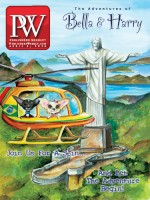When sales of manga began to slump back in the late 2000s, manga publishers and booksellers blamed the lack of new bestsellers. Where were the hits that would energize fans the way Naruto and Fruits Basket had earlier in the decade? It looks like those new books have finally arrived.
Today there are three chart-topping manga series racking up sales around the world. Sales of backlist manga are also growing, and there’s another wave of potentially big-selling titles just a little bit further down the road.
Sales of Kodansha’s Attack on Titan went through the roof in 2013, and the series and its spin-offs have sold millions of copies around the world in the last since it was first published in Japan in 2009. In the past year, titles from two other properties—Tokyo Ghoul, and One-Punch Man (both from Viz Media)—have topped BookScan’s graphic novel charts and placed among the top 20 sellers overall each month, a sign they are still bringing in new readers.
North American manga sales are down from the market’s peak in 2007, when they hit about $210 million, according to pop culture trade news site ICv2. By 2012, North American manga sales had declined to $65 million, before beginning to rebound to about $70 million in 2013 and reaching $75 million in 2014, according to ICv2. Figures for 2015 are not yet available, but ICv2 reported that early 2015 sales were up about 13% over the same period in 2014. Manga sales have improved enough that the bestselling manga on the 2015 BookScan chart, volume one of Tokyo Ghoul, sold just over 50,000 copies.
Improved sales of backlist titles have also contributed to a healthier market. “Tokyo Ghoul and One-Punch Man have been the standouts for us in the past year,” said Leyla Aker, Viz senior v-p for publishing. “But we also saw that the catalogue overall is growing.” Aker said other frontlist series and backlist series such as Death Note and Dragon Ball are also selling well.
ICv2 named Death Note as one of its top 10 manga franchises of 2015—although the last new volume came out in 2011. “I think it all comes down to quality,” said ICv2 CEO Milton Griepp. “Death Note is a good series.” Griepp compared Death Note to older nonmanga graphic novels such as Alan Moore’s Batman: The Killing Joke and Watchmen.
While Attack on Titan has been a major hit for Kodansha Comics, the publisher has also seen “strong, steady growth” in its other properties, according to Ben Applegate, who oversees the Kodansha Comics publishing team at its distributor, Penguin Random House Publisher Services. “The market showed extremely healthy growth in 2015,” he said. “Manga in particular outpaced graphic novels that year, and there have been some breakout hits, like Tokyo Ghoul, One-Punch Man, and Attack on Titan, but the biggest message is that even series with more modest expectations have been in the black, which is great news.” Applegate added, “It’s not just people coming back for a volume of Attack on Titan and going home—they are looking into other new series like A Silent Voice, like Noragami.”
Fans continue to rediscover older series, such as Kodansha's Fairy Tail, which debuted in 2008 and is up to 52 volumes. “Fairy Tail had its strongest year of sales in the U.S. ever in 2015,” Applegate said. “Even the first volume had its strongest year of sales in 2015.”
“The manga charts are fairly top heavy with respect to a handful of extraordinarily popular properties,” said Yen Press publishing director Kurt Hassler. “But there are any number of extremely popular and stable licenses in the market that may not reach that blockbuster threshold.”
What makes a blockbuster manga series? Having an anime tie-in often gives the associated print manga a boost. Sales of Attack on Titan exploded in 2013, when the anime started streaming in English. Aker said that Tokyo Ghoul was helped by the anime as well.
Characters matter too. “Ken Kaneki [the lead character in Tokyo Ghoul] is a really relatable character,” Aker said. She also noted that One-Punch Man is both an homage to the American superhero genre and a send-up of superhero characters. Griepp said One-Punch Man is doing well in comic shops, which usually favor superhero comics over manga, as well as traditional bookstores, where manga has thrived from the beginning.
Attack on Titan, Tokyo Ghoul, and One-Punch Man appeal more to adult men than earlier manga favorites such as Naruto and Fruits Basket, which appealed to teenage girls. Yen Press is bringing out a new edition of Fruits Basket that Hassler expects will appeal to new readers and existing fans, and Aker has high hopes for Yona of the Dawn, a new historical fantasy series.
A new series of hit manga titles could mean more sales for the whole manga category. “Hits help drive the market,” said Griepp. “They bring in more people, they expand the number of people who are engaging in the medium, so I think they help all the titles below them.”
Corrections: The publisher of Fairy Tale and Leyla Aker's title were incorrect in an earlier version of this story.



 Volume 263
Issue 14
04/04/2016
Volume 263
Issue 14
04/04/2016





